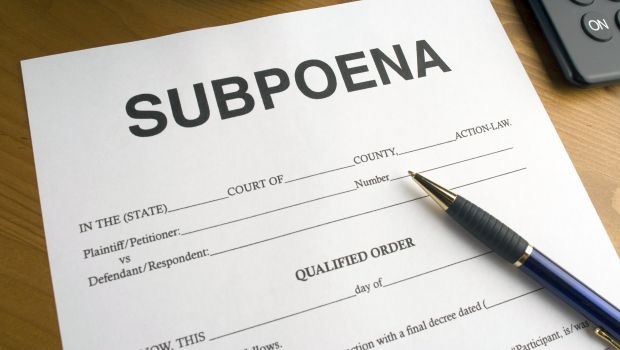If you own a self-storage facility long enough, you’ll eventually receive a subpoena for records or even witness testimony. You may also get a request from law enforcement to search a unit. Follow these practical steps when dealing with court orders.
November 28, 2017

If you own a self-storage facility long enough, you’ll eventually receive a subpoena for records or even witness testimony. You may also get a request from law enforcement to search a unit. Court orders and search warrants should not be ignored, but you also have a duty to your tenants. Here are some practical steps to follow when dealing with these issues.
Records Subpoena
This is the least intrusive request you may receive related to ongoing litigation, but beware! A crafty lawyer may use a subpoena to gather information in preparation for filing a lawsuit. Further, the request might seek sensitive information about your tenants and, therefore, should be examined closely. Follow these steps when dealing with any subpoena for a tenant’s records:
If someone is trying to serve you with a subpoena, don’t dodge it, as it may force the lawyer seeking documents to get an order from a court to compel you to appear. Don’t worry—being served a subpoena isn’t the end of the world. It just means you need to go to step two.
Call your attorney. Have him look over the subpoena and discuss it with you. If it’s non-invasive, easy to respond to and otherwise not objectionable, you’ll likely put the documents together and it’ll be over. If not…
If the subpoena falls into the "Are you kidding me?" category, your attorney can file a motion with the court to halt it or ask that it be narrowed in scope. For example, if it seeks all rental agreements from 1 A.D. to present, no court will enforce it, and it’ll be subject to a sharp narrowing. If it seeks sensitive information such as tenants’ personal identification, a court will likewise narrow the scope or disallow it altogether.
Do not ignore a subpoena, as this tells the court you don't care about its orders. That isn’t an option. Bringing your complaints to the court in a timely fashion (before the date the documents are due) is always your best option if strict compliance is too difficult.
Deposition/Testimony Subpoena
You may receive a subpoena seeking testimony about company policy or procedures, or eye-witness accounts of something that happened on your property. Always contact legal counsel for in this case. The last thing you want to do is testify without preparation and unintentionally subject yourself or your company to liability. Your attorney can call the other lawyer to determine if your testimony is necessary or if documents will suffice. He can also reschedule inconvenient dates and possibly obtain an agreement on narrowing the scope of the testimony.
Again, don’t ignore it. This can subject you to being compelled to show up in court and explain to a judge why you didn't comply. It's like going to the principal: You know you’re in trouble no matter what you say.
Search Warrants and Police Investigations
Unfortunately, you may sometimes have a tenant who isn’t a perfect citizen. I know it seems hard to believe, but criminals do occasionally rent storage units. I once had a client experience the following:
A doctor and partner in a medical practice became angry with his partners over a financial issue. One night he went to his office, loaded all the medical equipment into a truck and drove away. The next morning, he rented two large storage units and filled them with the stolen goods (the equipment was owned by the practice). Included in the items was a safe containing a large amount of cash—also not owned by the doctor.
A month or so later the police visited the storage facility and demanded to see the units. Although my client was unaware of these shenanigans, the story was believable, and he wanted to help the police with their investigation. However, they didn’t have a search warrant. The only thing they had was the sworn testimony of the tenant's former partners. What would you do?
The answer is simple: Tenant first. In fact, that two-word phrase will prevent a myriad of problems.
My client called me, and I spoke to the police directly. I explained the doctor's units were secure and we didn’t have the right to open them without his permission unless there was an emergency. Assisting in a criminal investigation isn’t an emergency unless officers believe there are dangerous materials or a person trapped inside. If we open the unit and it’s exactly what the police say it is, the tenant will still have a valid reason to argue we breached our rental agreement. So, two days later, a frustrated police officer returned with a search warrant, which we immediately honored.
The point is simple: Take subpoenas and search warrants seriously, but don’t panic. They’re not unchallengeable and often can be worked out in a less intrusive way. Remember, hiring counsel at the front end is cheaper and less stressful than doing so to get you out of jail for ignoring a court order.
Murphy Klasing is a partner with Weycer, Kaplan, Pulaski & Zuber P.C. He has a wide range of appellate, arbitration and trial experience, successfully handling numerous litigation matters. With more than a decade of experience in the self-storage industry, he serves as counsel for Public Storage Inc. in Oklahoma and Texas, and has defended matters involving allegations of breach of contract, code violations, employment issues, fraud, negligence, personal injury, premises liability and theft. To reach him, call 713.961.9045; e-mail [email protected]; visit www.wkpz.com.
About the Author(s)
You May Also Like





